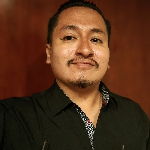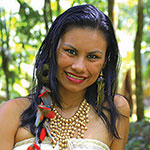Editor’s Note: The following texts are available in the original Portuguese and in translation to English and Spanish. Scroll down to read in Portuguese and English, and click “Español” to read in Spanish.
Índio eu não sou
Não me chame de “índio” porque
Esse nome nunca me pertenceu
Nem como apelido quero levar
Um erro que Colombo cometeu.
Por um erro de rota
Colombo em meu solo desembarcou
E no desejo de às Índias chegar
Com o nome de “índio” me apelidou.
Esse nome me traz muita dor
Uma bala em meu peito transpassou
Meu grito na mata ecoou
Meu sangue na terra jorrou.
Chegou tarde, eu já estava aqui
Caravela aportou bem ali
Eu vi “homem branco” subir
Na minha Uka me escondi.
Ele veio sem permissão
Com a cruz e a espada na mão
Nos seus olhos, uma missão
Dizimar para a civilização.
“Índio” eu não sou.
Sou Kambeba, sou Tembé
Sou Kokama, sou Sataré
Sou Guarani, sou Arawaté
Sou Tikuna, sou Suruí
Sou Tupinambá, sou Pataxó
Sou Terena, sou Tukano
Resisto com raça e fé
I am not an Indian
Don’t call me “Indian”
because this name never belonged to me
I don’t even want to carry as a nickname
an error that Columbus made.
Due to a mistake in the route
Columbus disembarked on my land
And in his desire to reach the “Indias”
He called me “Indio”
This name brings me so much pain
A bullet went through my chest
My cry echoed across the forest
My blood spilled on the ground.
He arrived late; I was already here
The caravel docked right there
I saw a “white man” climb
And I hid myself within my Uka1.
He arrived without authorization
With the cross and the sword in his hand
Before his eyes, a mission
To annihilate civilization
I am not an “Indian.”
I am Kambeba, I am Tembé
I am Kokama, I am Sataré
I am Guarani, I am Arawaté
I am Tikuna, I am Suruí
I am Tupinambá, I am Pataxó
I am Terena, I am Tukano
I resist with courage and faith.
Translated from Portuguese to English by Miranda Lopes
Para sempre Amazônia
Senhora Amazônia
Teus rios voadores
Tuas matas sagradas
Teu solo fecundo
Nós vamos guardar
Canoas e remos
Estrada molhada
Por entre as árvores
O sol nascerá
São janelas que se abrem
No meio da mata
Para olhar com esperança
A vida na terra
Para ver o mapinguari
A Matinta e o Matim Tim
Curupira enganar o caçador
E botar para correr
Quem chega na Amazônia para tocar o terror
Sinto o vento vargeiro
Chegar bem devagar
Seu sopro é mensageiro
Traz segredos do rio e do mar
Quero mais que 80%
De mata em pé
Quero mostrar ao curumim
O que lhe é de direito proteger
Para no fim descansar
No mundo da ancestralidade
Sany Amazônia
Sany paranawaçu
Iapã indá tana Saisu
Iapã kumiça muki may-sangara tuiuka.
Ikumi, ikumi, ikumi2
Amazonia Forever
Lady Amazonia
Your flying rivers
Your sacred forests
Your fertile soil
We will defend
Canoes and oars
Wet road
Between the trees
The sun will rise
They are windows that open
In the middle of the forest
To look with hope
Life in this territory
To see the mapinguari3
the Matinta and the Matim Tim4
Curupira to deceive the hunter5
And scares
Those who arrive in the Amazon to sow
terror
I can feel the wind
Coming very slowly from the ravines
Its breath is a messenger
It brings secrets of the river and the sea
I want more than 80%
Of the forest on its feet
I want to show the curumim6
What is his right to protect
To finally rest
In the world of ancestrality
Sany Amazônia
Sany paranawaçu
Iapã indá tana Saisu
Iapã kumiça muki may-sangara tuiuka.
Ikumi, ikumi, ikumi7
Translated from Portuguese to English by Maya Fernandes
Maria de todas as Marias
Maria dos grandes rios
Das barrancas e igapós
Maria de muitos sonhos
Amazônias
Somos muitas não estamos a sós
Maria
Dos furos e igarapés
De profundos olhares
Das rezas, benzimentos
Dos terreiros e encantarias
Marias, nossas pajés
Maria mãe da mata
Maria do cocar
Das lutas nas aldeias
Força no caminhar
Senhora das águas
Rogai por nós!
Maria mulher guerreira
De força ancestral
Resistência territorial
Maria das multivozes
Rainha, rogai por nós!
De joelhos em silêncio
Na dor e na alegria
Te pedimos em oração
Mais amor ao coração
Que chegue aos céus
Nossas vozes
De súplica e devoção
Somos romeiros e romeiras
Somos filhos, somos irmãos
Te pedimos por tantas Marias
Que tiveram a vida interrompida
Na dor e crueldade
Marias de várias etnias
Que agora estão na ancestralidade
Salve Maria!
Mãe de toda a gente
Do menino de rua
Do mendigo
Do migrante
Do indigente
Maria agricultura
Maria anciã
Pescadora
Lavadeira
Benzedeira
Parteira
Riozeira
Professora
Maria mãe solteira
Maria de muitas Marias
Dai-nos paz e proteção
Aumentai a nossa fé
E sede sempre intercessora.
Maria of all the Marias
Maria of the grand rivers
Of the ravines and igapos8
Maria of many dreams
Amazonians
We are numerous and are not alone
Maria
Of the channels and igarapes9
Of the deep eyes
Of prayers and blessings
Of the terreiros10 and incantations
Marias, our woman pajes11
Maria, mother of the forest
Maria of the cocar12
Of the struggles in the villages
the energy that drives us
Lady of the waters
pray for us
Maria, warrior woman
Of ancestral force
Territorial resistance
Maria of multiple voices
Queen, pray for us!
In pain and joy
On knees and in silence
We ask you in prayer
For more love in our heart
That our voices
Of plea and devotion
Should be heard in heaven
We are pilgrims
We are sons and daughters, brothers and sisters
We pray for so many Marias
Whose life was interrupted
By suffering and cruelty
Marias of many ethnic origins
who rest with the ancestors now
Hail Mary!
Mother of all people
Of the children in the streets
The homeless
The immigrant
The poor
Maria the farmer
Elder Maria
Fisherwoman
washerwoman
healer
doula
who lives near the rivers
teacher
Maria, single mom
Maria, of the many Marias
Give us peace and protection
strengthen our faith
And be forever our intercessor
Translated from Portuguese to English by Christian Elguera Olortegui
Translations by Miranda Lopes and Maya Fernandes completed in classes taught
by Professor Christian Elguera Olortegui at Marist College.
 Miranda Lopes is a double-major in history and global studies with a minor in Renaissance Studies at Marist College. She was born and raised in Mahopac, New York, and grew up around Portugal’s language and culture from her dad’s side of the family. Miranda hopes to continue learning Portuguese.
Miranda Lopes is a double-major in history and global studies with a minor in Renaissance Studies at Marist College. She was born and raised in Mahopac, New York, and grew up around Portugal’s language and culture from her dad’s side of the family. Miranda hopes to continue learning Portuguese.
 Maya Fernandes is a second-year student at Marist College studying Fashion Merchandising, concentrating on product development with a minor in Spanish language. She is from Miami, Florida, is half-Brazilian, and grew up speaking English, Portuguese, and Spanish. She has always had an interest in languages and wants to continue to grow her knowledge of different languages.
Maya Fernandes is a second-year student at Marist College studying Fashion Merchandising, concentrating on product development with a minor in Spanish language. She is from Miami, Florida, is half-Brazilian, and grew up speaking English, Portuguese, and Spanish. She has always had an interest in languages and wants to continue to grow her knowledge of different languages.
Christian Elguera Olortegui (1987) was born and raised in Lima, the capital city of Peru. However, he recognizes his family roots in Tingo María (a Peruvian Amazonian town in the province of Huanuco). He earned a bachelor’s degree in Literature from the Universidad Nacional Mayor de San Marcos and holds a PhD in Iberian and Latin American Languages and Literatures from the University of Texas at Austin. He also completed a Graduate Portfolio in the program in Native American and Indigenous Studies at this institution. Currently, Christian is an Assistant Professor of Spanish and Latin American Studies at Marist College and, since 2021, he has been a translator and Indigenous Literature correspondent for Latin American Literature Today (LALT). As a creative writer, he has received literary accolades in Peru, such as an honorable mention in the XXI Biennial Copé Short Story Award for his text “El extraño caso del señor Panizza” (2020), the Copé Silver Award for his short story “El último sortilegio de Fernando Pessoa” (2022), and the Copé Gold Award for his first novel, Los espectros (2023).
1 Refers to a house.
2 Vem Amazônia / Vem grande rio / Vamos cantar nosso amor / Vamos falar com a alma terra / Hoje, hoje, hoje.
3 Mapinguari, or mapinguary (also called the juma), is a mythical creature that terrifies people with its scream. Some people say the Mapinguari protect the Amazon rainforest and its animals.
4 Matinta Pereira is a malignant entity that flies in the darkness, sometimes as a witch, sometimes as a bird. The Matinta’s scream can be heard from long distances.
5 Curupira is the creator of the woods, predominantly described as a child with red hair and backward feet; he leaves misleading footprints and confuses hunters, protecting the trees and animals.
6 Curumim refers to a young boy or girl.
7 Come Amazonia / Come grand river / Let’s sing our love / Let us talk with the land soul / Today, today, today.
8 Forests in wet and humid regions.
9 Small streams in Amazonian areas.
10 Temples of worship in Afro-Brazilian religions.
11 Spiritual leaders in Indigenous communities.
12 Traditional Indigenous headdress.

 Miranda Lopes
Miranda Lopes Maya Fernandes
Maya Fernandes

